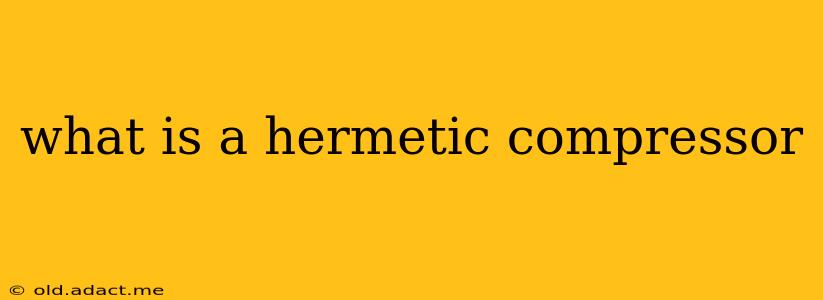Hermetic compressors are the workhorses behind many refrigeration and air conditioning systems. Unlike their open counterparts, they're sealed units, offering unique advantages and disadvantages. This comprehensive guide will delve into the intricacies of hermetic compressors, exploring their design, operation, applications, and common questions surrounding their use.
What Makes a Hermetic Compressor "Hermetic"?
The term "hermetic" refers to the compressor's airtight construction. The motor and compressor are completely enclosed within a single, sealed housing. This sealed environment prevents refrigerant from escaping into the atmosphere and prevents outside contaminants from entering the system. This design is a key differentiator from open compressors where the motor and compressor are separate components.
How Does a Hermetic Compressor Work?
The operation of a hermetic compressor is fundamentally the same as other compressor types: it compresses refrigerant vapor, raising its temperature and pressure. However, the sealed housing plays a critical role. The motor, typically an electric motor, is directly coupled to the compressor, eliminating the need for shafts, seals, and other components that would be found in open compressors. This direct drive improves efficiency and reduces wear. The refrigerant flows through internal passages within the hermetically sealed casing, completing the refrigeration cycle.
What are the Advantages of Hermetic Compressors?
Hermetic compressors offer several compelling advantages:
- High Efficiency: The direct drive and sealed design minimize energy loss, leading to improved overall system efficiency.
- Reduced Leakage: The sealed casing prevents refrigerant leaks, which are environmentally damaging and can lead to reduced system performance. This contributes to a smaller environmental footprint.
- Compact Design: Their integrated design allows for a more compact and space-saving unit.
- Quiet Operation: The sealed construction often results in quieter operation compared to open compressors.
- Improved Reliability: Fewer moving parts and the absence of external seals contribute to increased reliability and longevity.
What are the Disadvantages of Hermetic Compressors?
While offering many benefits, hermetic compressors also have some drawbacks:
- Difficult Repair: If the motor fails, the entire unit typically needs replacement, as repair within the sealed casing is complex and often impractical.
- Limited Motor Options: The sealed environment limits the types of motors that can be used, potentially restricting choices for specific applications.
- Overheating Issues: Because the motor and compressor are enclosed, overheating can be a concern if proper ventilation and cooling are not provided.
What are the Common Applications of Hermetic Compressors?
Hermetic compressors find widespread use in a variety of applications:
- Refrigeration: Domestic refrigerators, commercial refrigerators, and other refrigeration systems frequently utilize hermetic compressors.
- Air Conditioning: Many smaller air conditioning systems, including those found in homes and smaller commercial spaces, employ hermetic compressors.
- Heat Pumps: These systems also benefit from the efficiency and reliability of hermetic compressors.
- Vending Machines: The compact size and efficient operation make them suitable for these applications.
How Long Do Hermetic Compressors Last?
The lifespan of a hermetic compressor can vary significantly depending on factors such as usage, maintenance, and environmental conditions. With proper maintenance and a stable operating environment, you can expect a lifespan of many years; however, it's crucial to note that the hermetic nature often necessitates replacement of the entire unit rather than just the motor in case of failure.
Are Hermetic Compressors Expensive?
The cost of a hermetic compressor can vary based on size, capacity, and features. Generally, they are comparable in price to other types of compressors with similar capacity. However, the long-term cost savings from improved efficiency and reduced refrigerant leaks often outweigh the initial investment.
What is the Difference Between Hermetic and Semi-Hermetic Compressors?
While hermetic compressors are completely sealed, semi-hermetic compressors offer access points for servicing and maintenance. This allows for potential repairs, unlike fully hermetic units, but can lead to slightly reduced efficiency and a higher risk of leaks.
This detailed exploration of hermetic compressors should provide a thorough understanding of their functionality, advantages, disadvantages, and various applications. Remember to consult with refrigeration specialists for any specific questions or concerns related to your system.
